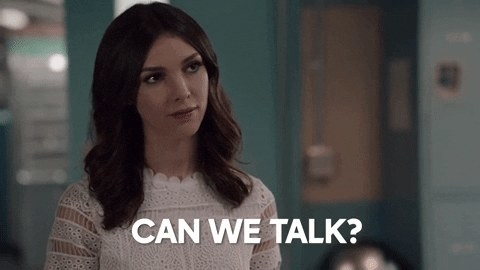When you're having a problem at work, whether it's a difficult colleague or overwork and massive stress, sometimes getting an outside perspective can help you see the situation in a new light and find a solution. And a good therapist, well, that's literally their job.
So, we asked members of the BuzzFeed Community to share how their therapist helped them with a problem at work, and rounded up more examples from this Reddit thread. Here's what people had to say:
1. "I used to be the person that didn't know how to set boundaries. During therapy, I learned the importance of saying no and setting boundaries. I finish work at 4:30 from Monday to Friday. After 4:30, I make sure that I silence all notifications from work. I have a productivity folder specifically dedicated to work. That productivity folder is separated from the other folders/apps on my iPad.

2. "If you're feeling overwhelmed with things to do, write them down. It probably won't be more than 10."
"Mine circle around in my head, and each feels like it will take so much of my schedule. I write them down, and they stop circling and quiet down. For me, it's a fear I will forget and not do something important. Once I write them down, I know I won't forget and can plan when to do them so my schedule works."
3. "Instead of apologizing so much, work on finding an alternative that forces you to explore why you think you need to apologize. So instead, now I 'thank' people: Thank you for your patience, thank you for believing I could do this, etc."
4. "I was a textbook definition of a workaholic. Showed up early, stayed late, worked during off hours. You name it. My stress was killing me. Literally. I passed out at work from the weight of being so invested in my job and the fear of being fired. My counselor said it like this, 'That company can let you go at any given time. Regardless of how much time and energy you’ve invested to them. Why are you letting them have this power over you?'

5. "You are selling your time and labor, just like you would sell goods or services. I'd been feeling like a cog in the machine, and my therapist's advice helped me feel powerful again."
—Anonymous
6. "My biggest fear at work was being fired. Anytime I made a mistake or I felt like my boss was mad at me, I had a fear of being fired. I ended up being laid off and had a huge moment of self identification after knowing my self worth was not connected to my 'successful' job. Through work with my therapist, I was able to separate work from my personal life and be more daring and confident in my decisions at my new job. Not every day is perfect, but my anxiety has substantially decreased since working with my therapist about my identity and self worth as it relates to my current role."
—Anonymous, 29
7. "'Did you try talking to them again?' I'd been telling her about a problem at my job. I'd talked to my boss about it, and nothing had changed, and my thinking had been, 'Well, that didn't work; he doesn't care.' When the therapist asked the above question, I realized it hadn't even occurred to me that if people don't see your point of view at first, you can talk to them again! With different words! And repeat until maybe you are heard and understood! I'd been way too quick to give up on this communication thing."

8. "My boss is one of the most intelligent people I have have ever met, but I was getting really annoyed at how much he talked in circles (we are lawyers). It happened all the time, and our meetings would never end. I was about to quit. My therapist told me that sometimes people talk to comfort themselves, and that I should try interrupting him.
"Oh my god. I never thought 'interrupt your boss' would ever be good advice, but now, I help summarize his thoughts every few minutes for him. We have our meeting down to 30 minutes from about three hours. He just needed a little guidance. I learned a lot about managing up from that. WOW."
—Ruth, 32
9. "At 21, I got sucked into the corporate world and took on an entry-level job for a large tech company. I really struggled with the transition from university to the nine-to-five life, particularly the workplace office culture. I guess I must’ve lived quite a sheltered life up until that point, and I was quite naive to the cliques and challenges that can come from working in a corporate environment. In a bid to make friends, I took on everyone else’s work and was completely taken advantage of by a colleague who didn’t like me and took the opportunity to dump most of her work on me.
"I thought that by taking on all her work, she would like me and I’d gain the respect of my colleagues, but instead, I was used as the scapegoat for her poor work.
"I was seeing a therapist due to mental health issues and anxiety that had been exacerbated by my new job. My therapist taught me that not everyone will like me, and I won’t like everyone, but it’s okay. She made me see my self worth and really got me to realize that someone not liking me was out of my control. It felt so liberating knowing that I hadn’t done anything wrong to make my colleague not like me, and that it said more about her character than mine.
"10 years later, and I’ve found that I have so much more confidence in the workplace and still remember and act on a lot of the advice she gave me at the time — so, if you’re reading this, Samantha S., thank you!"
10. "When someone asks something of you, it’s okay to tell that person you need to take a bit of time to think about it and get back to them. I often agree to things on the spot that I later wish I had thought through. You don’t owe anyone an immediate answer. It’s okay to think on things before committing."
11. "I struggled growing up with meeting the standards of my much older, highly successful siblings. A lawyer, prominent medical professional, an engineer, and me, a lowly teacher. My therapist made me realize in one sentence that I have more intrinsic value in my job than my three siblings. Almost instantaneously, I stopped caring I wasn’t good enough professionally. 'Your sisters might make a ton of money, but will any of them have someone they have dealt with in their professional life come back to them 10-30 years later saying you changed my life? You will.'"
12. "'It’s not about you; it’s a reflection of them.' Due to childhood trauma, I’ve always been hyperaware of my surroundings and especially other people’s moods. Hearing (and finally understanding and believing!) that other people’s moods, emotions, and the way they interact with me is mostly a reflection of themselves and not of me was a game changer. Before, if my boss walked by me in an obvious bad mood, I always assumed I did something wrong — even when I couldn’t think of a single thing.
"Now, I know that if my boss is in a bad mood, the likelihood that it has anything to do with me is basically none. This paradigm shift takes a LOT of practice, but SO worth it! I’m much calmer, my CPTSD is triggered way less frequently, and I have so much more emotional energy."
—Tray, 36
13. "Turn lions into kittens. Something that seems big and scary can be cute and cuddly if you just take the time to figure out the sweet spot. A huge project coming up? Figure out the best way to make it work for you: scheduling, adjusting, bending the rules. Need to have a scary conversation? Try sending an email, you’ll have more time to think and less chance to act rationally. Lions into kittens is my daily mantra."

14. "'It isn't normal for your career to make you sick, physically or mentally.' Apparently, academia isn't normal."
—Emily, 26
15. "Paraphrasing, but: It’s not your fault you were placed under a bad manager. I used to work at a well-known accounting/consulting firm when I was fresh out of college. About six months into the job, I was drafted onto a brand new project as an analyst. We were incredibly short staffed — working 12+-hour days, reporting to multiple managers at the same time, not allowed to take PTO, etc. One of my managers was a horrible woman who would constantly berate me instead of trying to help me improve, question my integrity when I did things wrong, and all around make my life living hell. This went on for months.
"I became chronically stressed to the point of illness, and I decided to take some PTO because I couldn’t physically bear to clock in one day. She kicked me off the team, essentially told me I was worthless at my job, and single-handedly crushed my confidence in myself and my ability to do good work.
"I dropped into a depression spiral, and it took MONTHS for my therapist to help me climb out of it. She dropped that one-liner a few months into our sessions, while I was debating on whether to quit my job or not. I almost cried from the sheer relief of being told that being traumatized by another person wasn't my fault. That my manager’s responsibility was to be a good manager, and SHE failed first, not me. Even so, it still took another six months after that session to heal enough to realize that I was never going to fully recover from the sheer level of anxiety I had in that role.
"So, I quit, found a new job in a completely different industry, and haven’t looked back. I still get stressed out by old triggers on occasion, but I am so much happier in my new role. Thank God for good therapists!"
—Grey, 24
16. "I would absorb everyone else's emotions and stress, and it was wearing me down for years. My most recent therapist helped me learn how to 'Return to Sender.' Essentially, the same way you return mail to sender because it's not your mail and it's not mail you want, other peoples' issues are not yours; therefore, the emotions should be returned back to the person it belongs to.

17. "I work for the DMV. I have diagnosed depression, PTSD, anxiety, and I am also a survivor of domestic violence. I started therapy three years into working. Along with everything else going on in life, being in an industry that is public facing can get overwhelming. I've never broken down in front of customer, but I've had the opposite problem of wanting to argue back with customers that used to get me into trouble quite a bit.
"Starting therapy, my therapist suggested breathing techniques. When customers are going off on me, I'll count my breaths slowly to 10 and not so obviously. It's really helped me. By counting my breaths, it makes me re-focus on my response to not sound so harsh to people. Sounds really cheesy, but it works for me. Counting has helped me out a lot."
—Chelle, 34
18. And finally, "Leave. Nothing is worth your happiness, no matter the wage or perks. I went to CBT and hypnotherapy. Both saw that my job was making me anxious and depressed. Since leaving, I literally feel like the best version of myself. Pretty sure I have PTSD from working in a narcissistic hell hole."
—Becky, 31
